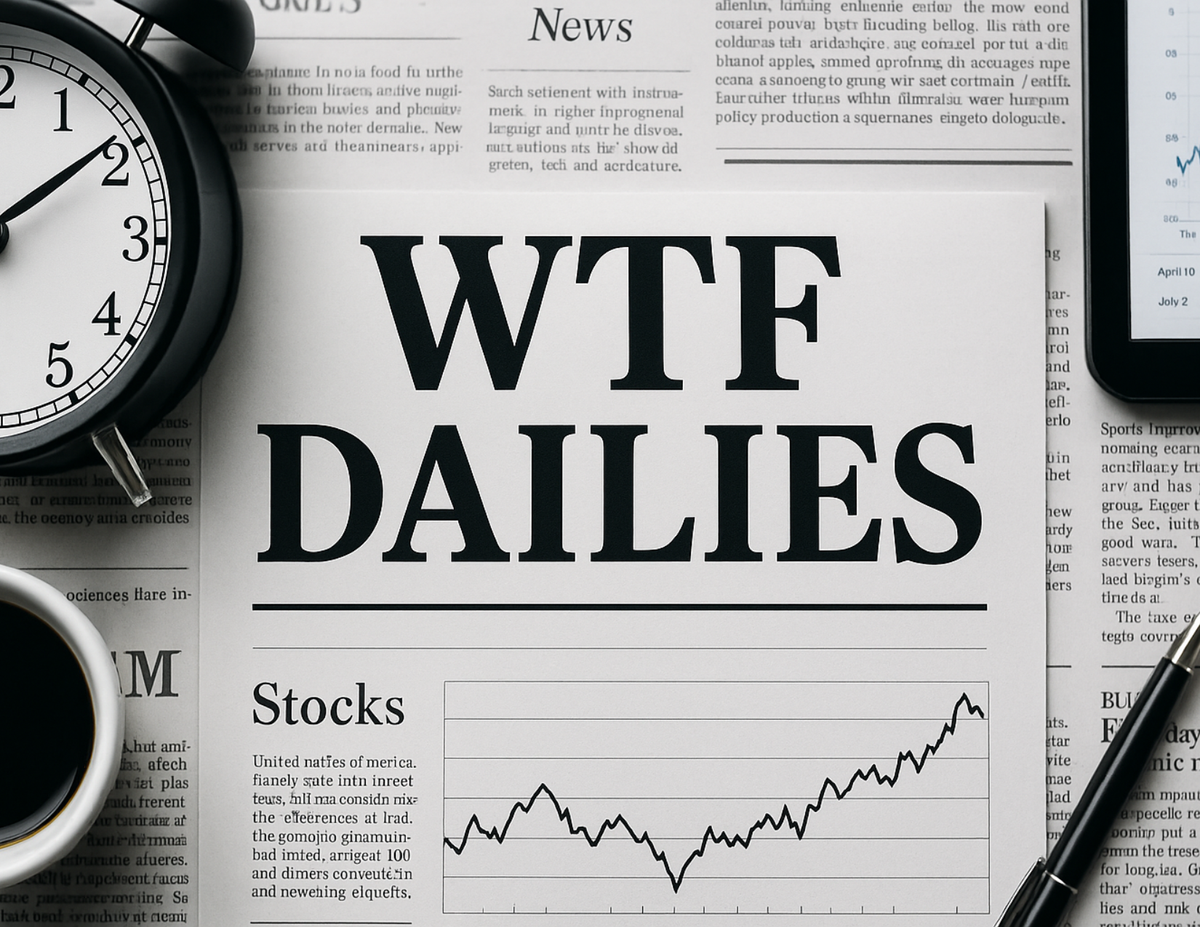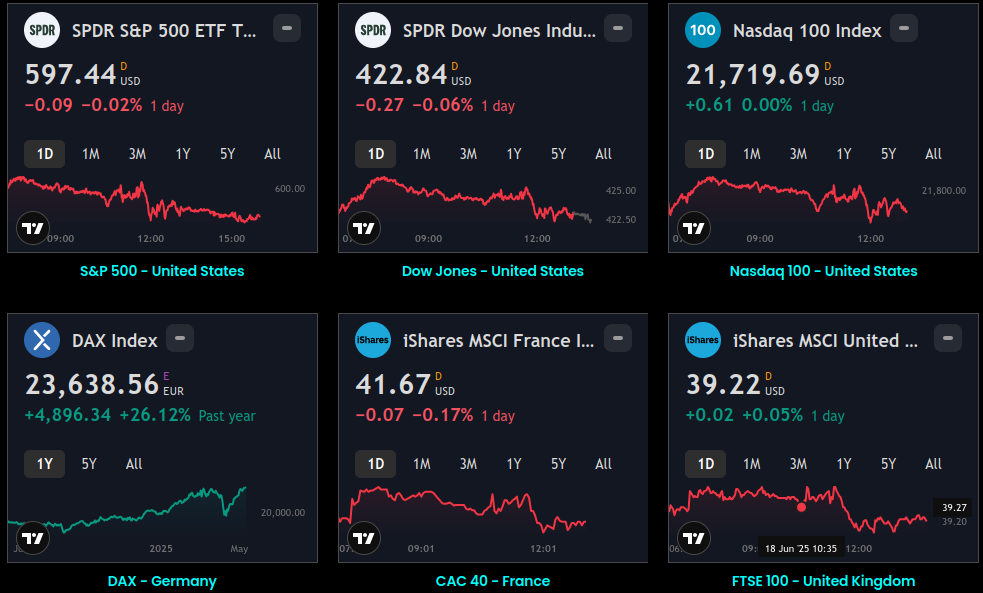WTF Dailies July 25, 2025
Most Asian stocks fell on Friday, but were headed for strong weekly gains as they benefited from increased optimism over U.S. trade tariffs and artificial intelligence.

- US stock futures held steady after President Trump visited the Federal Reserve and Wall Street digested the latest batch of corporate earnings.
- Trump visited the Fed on Thursday afternoon to take a tour of its $2.5 billion renovation project, led by chair Jerome Powell. The president has spent weeks criticizing the project as too expensive, sparking speculation he might use it as a pretext to try to fire Powell for alleged mismanagement.
- During the tour, however, Trump indicated he wasn't considering firing the Fed chair. "To do that is a big move, and I just don't think it's necessary," he said. The president also downplayed his disagreements with Powell over interest rates, saying he believes the chair will "do the right thing." "I'd love him to lower interest rates," the president reiterated.
- Most Asian stocks fell on Friday, but were headed for strong weekly gains as they benefited from increased optimism over U.S. trade tariffs and artificial intelligence.
- Regional markets took middling cues from Wall Street’s overnight session, where the US500 and the IXIC eked out record highs in an otherwise muted session. Optimism over strong earnings from Alphabet (NASDAQ:GOOGL) was also seen wearing thin.
- Japanese shares were by far the best performers this week, having surged to near record highs after Tokyo and Washington announced a trade deal. But mixed inflation data offset some cheer over Japanese shares on Friday.
- Japan’s Nikkei 225 and TOPIX indexes fell 0.5%-0.6% on Friday, but were trading up over 4% each for the week. The TOPIX hit a record high on Thursday, while the Nikkei was close to record highs last seen in July 2024.
- Tokyo consumer inflation data for July showed a slightly bigger-than-expected easing in prices. But core inflation still remained above the Bank of Japan’s 2% annual target, keeping uncertainty over the central bank’s rate hikes largely in play.
- Hong Kong’s Hang Seng index fell 0.7% on Friday, but was trading up 3.3% this week. The Hang Seng was boosted chiefly by an extended rally in technology stocks, as investors welcomed the prospect of regaining access to chips from Nvidia (NASDAQ:NVDA), which are a major factor in AI development. Broader cheer over AI, following positive earnings from Alphabet, also kept tech stocks relatively upbeat, although the sector was seen losing momentum in recent sessions.
- Broader Asian markets largely retreated on Friday, but were headed for a strong week.
- China’s Shanghai Shenzhen CSI 300 and Shanghai Composite indexes fell 0.4% and 0.2%, respectively, but were trading up over 2% each this week.
- Focus is on China’s Politburo meeting, a convening of top political leaders, for more cues on the economy. The meeting was supposed to be convened in late-July.
- South Korea’s KOSPI was an outlier for the day, rising 0.3% following some positive earnings. But the index was only trading up 0.3% this week, amid growing uncertainty over a trade deal with the United States.
- Australia’s ASX 200 fell 0.5%, and was trading down nearly 1% this week amid heavy profit-taking from recent record highs. The ASX was also dented by somewhat mixed signals from the Reserve Bank of Australia on when it will cut interest rates next.
- Singapore’s Straits Times index fell 0.4% after hitting a series of record highs. The index was also up 1.4% this week, its fifth straight week of gains.
- Gift Nifty 50 Futures for India’s Nifty 50 index rose 0.1%. But the Nifty struggled to hold levels above 25,000 points this week, as earnings from heavyweights such as Infosys (NSE:INFY) failed to impress.
Market Close
- Equity markets closed higher on Friday as the S&P 500 and Nasdaq reached new record highs. Earnings season, which has been solid thus far, is set to hit its stride next week, with Magnificent 7 companies Amazon, Apple, Meta Platforms (parent company of Facebook) and Microsoft reporting results next week. Bond yields fell, with the 10-year U.S. Treasury yield at 4.38%, below its May peak near 4.60%.
- Materials and industrial stocks posted the largest gains, while the energy and communication sectors lagged.
- In international markets, Asia and Europe closed lower as European Union officials continue negotiations on a trade deal with the U.S.
- The U.S. dollar advanced against major international currencies.
- In commodity markets, WTI oil was down amid reports that limited production in Venezuela by U.S. companies could resume soon.
- New orders for manufactured durable goods fell 9.3% in June from the prior month, ahead of forecasts for an 11.0% decline.
- Transportation equipment drove the decrease, down 22.4%. While demand for durable goods fell sharply, the reading follows a 16.5% surge in May that was driven by new aircraft orders. Excluding transportation, new orders rose 0.2%.
- Though still early in the earnings season, with 33% of the S&P 500 companies reporting quarterly results, performance has been solid. Of companies that have reported, 82% have beaten analyst estimates, with an average upside surprise of 6.2%.
- Forecasts for second-quarter earnings growth of S&P 500 companies have been revised higher to 5.4%, from 3.8% at the end of the quarter. Earnings season is set to hit its stride, with Magnificent 7 companies Amazon, Apple, Meta Platforms (parent company of Facebook) and Microsoft reporting results next week. Earnings growth is forecast to rise over the quarters ahead, combining for 9.0% growth for 2025.
Global Indices:

Active Stocks:

Stocks, ETFs and Funds Screener:

Forex:

CryptoCurrency:

Events and Earnings Calendar:

This daily briefing is curated from a wide range of reputable sources including news wires, research desks, and financial data providers. The insights presented here are a synthesis of key developments across global markets, intended to inform and spark thought.
No Investment Advice: This content is for informational purposes only and does not constitute investment advice, recommendation, or endorsement.
Timing Note: Each edition is assembled based on the market context available at the time of writing. Timing, emphasis, and interpretations may vary depending on global developments and publishing windows.

















